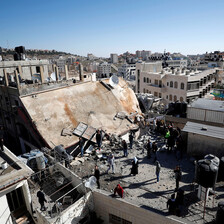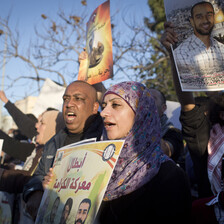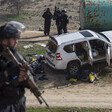The Electronic Intifada 13 January 2017
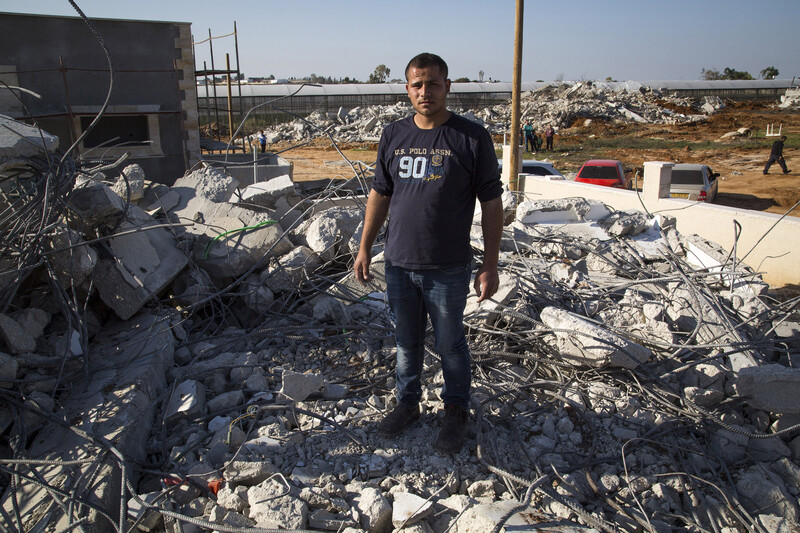
Amer Makhlouf, Abu Amid’s son, is among those whose homes were demolished in Qalansawa, a town in Israel, on 10 January.
ActiveStillsHassoun Makhlouf spent years washing cars to save enough money to build his own house. But in just minutes, on 10 January, Israeli bulldozers razed that dream to the ground.
Makhlouf, 56, had spent most of his life in rental accommodation. He retired early due to an on-the-job injury, but had managed to save enough money to build a home for himself and his wife, and help his sons build houses next door in the town of Qalansawa in present-day Israel.
The construction was only completed two months ago. On Tuesday, Makhlouf’s home was among 11 destroyed as a fleet of heavy machinery, backed by hundreds of Israeli police, some mounted on horses, raided Qalansawa.
“They turned the town into one big military zone,” said journalist Samira Haj Yahia, who witnessed the demolitions. “We initially thought that they came to destroy one home. But we were stunned to see nine bulldozers and a massive police presence.”
The pretext for the demolitions was that the homes were built without permits. Residents said the razed homes were located on private Palestinian land in the village’s western neighborhood, a designated agricultural zone, meaning that residents cannot attain permits.
Makhlouf, also known as Abu Amid, acknowledged that he hadn’t obtained permission, but said he was hoping that a master plan for the town – which the mayor of Qalansawa said the Israeli government has ignored for decades – would eventually be approved and legalize the homes.
“I put all I had into building this home and I still haven’t paid the contractor and I also took out a loan from the bank in order to get the houses done,” Abu Amid said. “And now we have lost everything. I saw their bulldozers destroy my home in front of my eyes and I could not do anything.”
Like the other Qalansawa residents whose homes were demolished on Tuesday, Abu Amid said he had only received a warrant two days earlier that gave a 45-day deadline to petition against the demolition order. “But they came too early even before we could go to the court.”
Abu Amid, his wife and sons, now without shelter, are staying with a relative. “Some women insisted on setting up a tent on the rubble of the houses. It is impossible to do that in this freezing cold,” he said.
Anything but egalitarian
The mayor of Qalansawa, Abdel Basset Salameh, resigned in protest of the demolitions.
“If I cannot protect residents from demolitions, what is the point of heading a municipal council?” he told The Electronic Intifada, saying the demolitions represent an “existential threat to all of us.”
More than bureaucratic enforcement of a zoning violation, the demolitions are viewed by many as reprisals for the impending eviction of the unauthorized settlement of Amona in the occupied West Bank.
To appease the settlers in Amona, and Israelis critical of their evacuation, Prime Minister Benjamin Netanyahu promised to crack down on “illegal construction” across the country.
“I will not have double standards on enforcing the law between citizens of Israel, between Jews and Arabs, between one person and the next,” Netanyahu said.
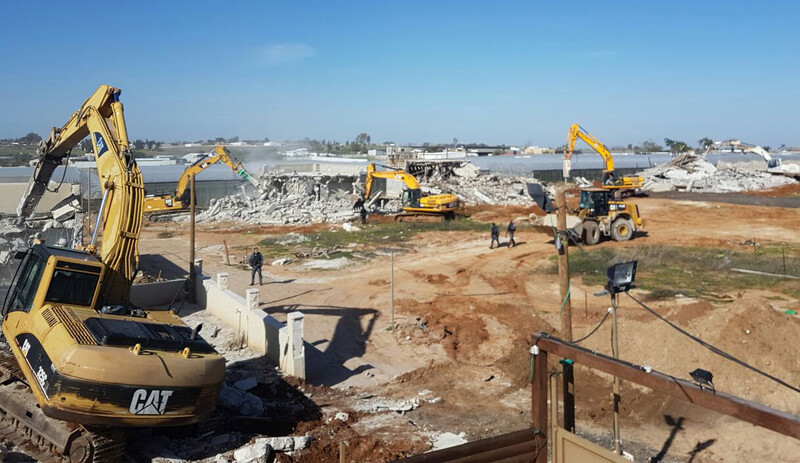
Eleven homes were destroyed in Qalansawa on 10 January.
But planning and construction in Israel is anything but egalitarian.
Since its establishment in 1948, Israel has employed an array of policies to significantly reduce the amount of land Palestinians are allowed to use or live on, while vastly expanding the areas designated for exclusive Jewish use.
These include mass confiscation of lands belonging to Palestinian refugees; denying internally displaced Palestinian citizens the right of return to their villages depopulated in 1948; the systematic segregation in housing between Palestinians and Jews; and the exclusion of Palestinians from the national planning sector and from national master plans.
This has resulted in the reduction of the jurisdiction held by Palestinian local authorities to just 2.5 percent of the land, and in severe housing shortages across Palestinian communities. According to the human rights group Adalah, Palestinian citizens in Israel face a shortage of 6,000 housing units per year in addition to the decades-long accumulative shortage.
Though Palestinians make up about 20 percent of the state’s population, less than 5 percent of housing tenders issued by the Israel Land Authority in 2015 were allocated to Palestinian communities, according to Adalah.
Proposal to demolish thousands of homes
The government greenlighted the destruction of tens of thousands of homes in Palestinian communities across Israel last year.
The proposal – which passed a first reading in the Knesset and is expected to pass the second and third and become law – outlines the establishment of a national enforcement unit to tackle unauthorized construction in Palestinian towns and villages in Israel.
The draft law requires local authorities to turn over any information requested by the enforcement body, effectively turning elected leaders into spies and agents of destruction against their own communities.
The bill drastically restricts the role of the judiciary to intervene and authorizes the use of “reasonable force” to carry out demolition orders.
Israeli authorities have not waited for the use of force to be enshrined by law. That provision was put into effect in Qalansawa on Tuesday.
Local youth tried to block the bulldozers by parking their cars at the entrance of the neighborhood where the demolitions took place, but Israeli police smashed their windows. Abu Amid himself was beaten.
“They also pushed a pregnant woman who was transferred to hospital and arrested a guy who tried to stand in their way,” he said. “We had to plead with the youth to stay away because we were too worried they might be arrested and because we knew there was no way we could stop the demolition.”
A country-wide general strike was declared by Palestinians in Israel after the demolitions and the Joint List, the body representing Palestinian parties in Israel’s parliament, the Knesset, condemned the demolitions as a “heinous crime and an act of war.”
A large demonstration protesting the demolitions was held on Friday.
Khaled Abu Arar, 70, is originally from the village of Arara in the southern Naqab desert. He and his family were displaced from there decades ago after Israeli authorities confiscated large swathes of their land. They moved to Qalansawa, where they eventually bought a piece of property. Four of the homes demolished there belong to three generations of his family.
“Israel displaced us twice, once by confiscating our land and now by demolishing the homes,” Abu Arar told The Electronic Intifada.
No matter whether they hold Israeli citizenship and can vote in the country’s elections, or live under military occupation in the West Bank and Gaza Strip, Palestinians face the same threat to their homes. The legal mechanisms behind the demolitions and the forces who carry them out may vary, but aim behind the violence is the same: to push Palestinians off the land.
“We don’t build without permits because we like it,” Qalansawa mayor Salameh said. “We are forced to do so because the Israeli authorities leave us with no other choice.”
Budour Youssef Hassan is a Palestinian writer and law graduate based in occupied Jerusalem. Blog: budourhassan.wordpress.com
